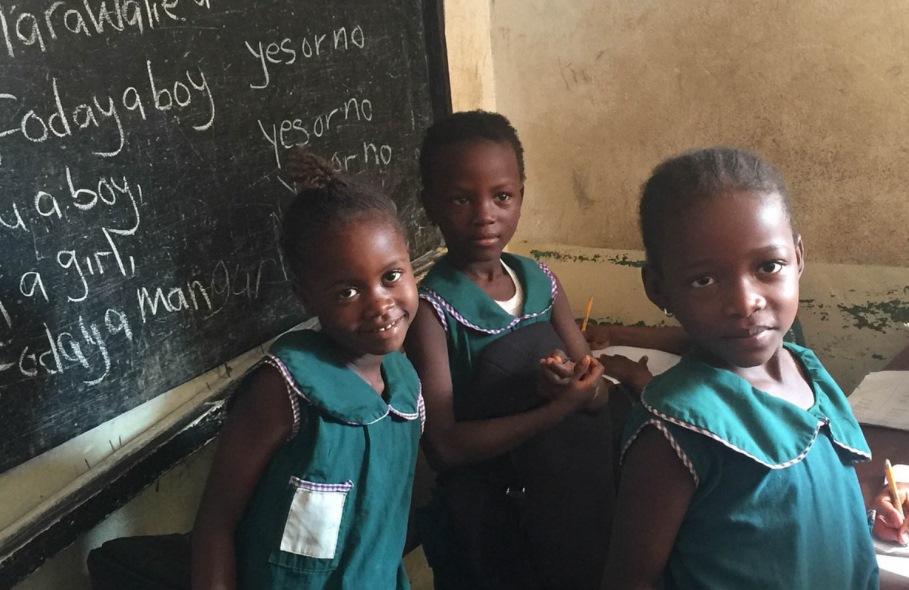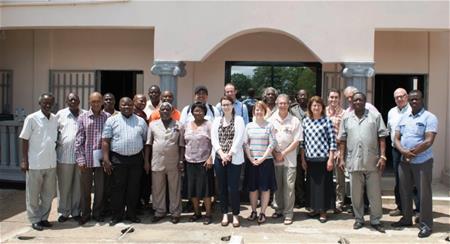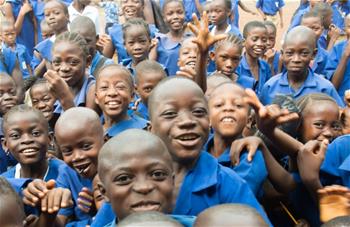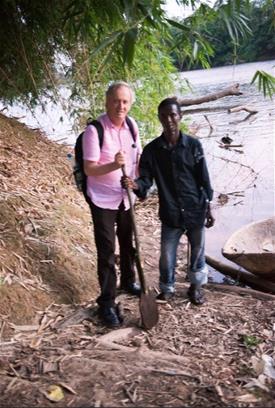Longstanding UI-Njala bond rekindled during Sierra Leone visit by Illinois scholars
by Sal Nudo / Jun 16, 2016

Education at Illinois scholars Dean Mary Kalantzis and Professor Bill Cope were part of a University of Illinois contingent that traveled to Sierra Leone for two weeks in late May. The objective of the visit was to re-establish longstanding ties between two land-grant universities that vary greatly in resources but share some of the same educational goals.
The trip was made possible through the Illinois-Njala Global Health Partnership, a 2014-2015 Focal Point project supported by the Graduate College.
Health Partnership, a 2014-2015 Focal Point project supported by the Graduate College.
Back in 1963, the U.S. and Sierra Leone governments collaborated on an agreement to evaluate the necessities for agricultural education in the West African country. The result was the formation of Njala University College, which was based on the land-grant model in which the University of Illinois was established.
During the 1960s and 1970s, Njala was supported by the U.S. Agency for International Development and Sierra Leone’s government. Illinois faculty and staff went to Sierra Leone to help begin departments at Njala in agriculture, education, and other areas. Since the partnership began, faculty, staff, and students from both institutions have benefitted mutually from engagement in research, teaching, and service opportunities.
 Over the decades, however, Sierra Leone has gone through its share of strife. More than 50,000 people died during a civil war in the country that lasted from 1991 to 2002. More recently, the threat of the Ebola virus halted all Illinois student-related programs to Sierra Leone. For varied reasons, the longstanding partnership between Illinois and Njala has fluctuated in strength but continues.
Over the decades, however, Sierra Leone has gone through its share of strife. More than 50,000 people died during a civil war in the country that lasted from 1991 to 2002. More recently, the threat of the Ebola virus halted all Illinois student-related programs to Sierra Leone. For varied reasons, the longstanding partnership between Illinois and Njala has fluctuated in strength but continues.
Dean Kalantzis said the Illinois scholars she traveled with to Sierra Leone are committed to outreach and service and strive to make a genuine difference in the lives of others through respectful partnerships that solve problems and build capacity.
“For me, it was both a sobering and inspirational experience,” Kalantzis said. “Sierra Leone is one of the poorest countries on Earth. The conditions under which people live and learn are indescribably lacking in material resources. However, the human spirit and the talent of those we met were incredible but severely hampered by the struggles to provide for even the most basic of educational needs.”
"For me, it was both a sobering and inspirational experience."
Dean Mary Kalantzis
Kalantzis and Cope were joined by Kenny Long, a Ph.D./M.D. student in bioengineering; Jenny Amos, a teaching associate professor in the College of Engineering; Erin Kerby, a veterinary sciences librarian; and Paul McNamara, an associate professor in the College of ACES. The scholars were accompanied by delegates from the University YMCA.
Cope said it is unrealistic at this point to envision Njala with large, gleaming buildings spread all over the campus. Corruption, low wages, and a broken taxation system are preventing education in Sierra Leone from rising.
“When you go to a school with no electricity, no windows, very few books, the biggest contrast is just resourcing,” he said. “It’s just the teacher and the blackboard.”
Still, Cope is optimistic about the fact that 90 percent of Sierra Leoneans have mobile phones. He said it may be possible to bypass the world of libraries and expensive buildings and build a “lightweight e-learning infrastructure,” a possibility that was discussed during the trip.
The UI scholars visited numerous local elementary schools and high schools, where they made presentations and observed. Cope said the students he saw want to someday be accountants, doctors, lawyers, and teachers. But the reality is that few such jobs like that exist in Sierra Leone. He aims to help change that by making learning more accessible in a country that has incredible natural resources and is laying down fiber optics.
and high schools, where they made presentations and observed. Cope said the students he saw want to someday be accountants, doctors, lawyers, and teachers. But the reality is that few such jobs like that exist in Sierra Leone. He aims to help change that by making learning more accessible in a country that has incredible natural resources and is laying down fiber optics.
“There’s work to be done there, and accessible learning is one way,” Cope said. “It may be possible to provide access. People there never had landline phones before, but now they have mobile phones because they’re cheap and accessible.”
Cope and his colleagues know that providing accessible education in Sierra Leone is a huge job, but they are doing their part to continue a longstanding bond and to enhance learning for people in a country who desperately want it.
Discover more about the history of Njala and Illinois, view a report about the first two years of the partnership, and view photos of the trip taken by Bill Cope.